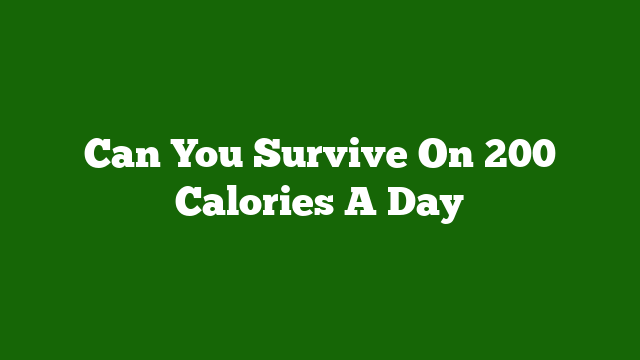Last Updated on June 12, 2023 by Umar
Surviving on 200 calories a day is a topic that has sparked curiosity and debate.
While it may seem like an extreme approach to weight loss, it’s essential to understand the potential risks and benefits associated with such a low-calorie diet.
This comprehensive guide will explore personal experiences, research, and statistics to provide a well-rounded perspective on this controversial topic.
Personal Experiences and Stories
In an experiment documented by The Daily Beast, a journalist tried the 4-Day Diet, which involved all-day walking and near starvation, consuming only 220 calories a day
. The diet led to constant hunger, unexpected side effects like peeing blood, and blisters in uncomfortable places.
Despite these challenges, the journalist managed to complete the experiment without taking time off work.
Research and Statistics
A study conducted in Spain followed 15 obese participants who subjected themselves to a diet of about 360 calories a day while walking for eight hours
. The researchers initially expected the participants to overeat and regain the weight lost, but after a month, many had lost even more weight. This study suggests that a low-calorie diet combined with physical activity can lead to weight loss.However, it’s essential to consider the minimum calorie intake required for proper bodily function.
Most adults need at least 2000 calories to sustain metabolism, muscle activity, and brain function. Consuming too few calories can lead to weight gain and various diseases. The minimum recommended calorie intake is 1800 for both sexes.Starvation calories are defined as an intake of fewer than 600 calories per day. Any caloric intake below the recommended minimum doesn’t provide the body with the fuel it needs to function properly. A starvation diet doesn’t promote weight loss because your metabolism slows down in response to low caloric intake.
Conclusion
While some personal stories and research suggest that it’s possible to survive on a low-calorie diet, it’s crucial to consider the potential risks and long-term effects on overall health.
Consuming fewer than 600 calories per day is considered starvation, and any caloric intake below the recommended minimum can negatively impact bodily functions
. It’s essential to consult with a healthcare professional before attempting any extreme diets or drastic changes in calorie intake.

